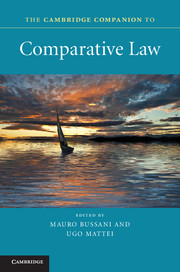Book contents
- Frontmatter
- Contents
- Contributors
- Abbreviations
- Preface
- Part I Knowing comparative law
- Part II Comparative law fields
- 6 Comparative studies in private law
- 7 Comparative administrative law
- 8 Comparative constitutional law
- 9 Comparative criminal justice
- 10 Comparative civil justice
- 11 Comparative law and international organizations
- Part III Comparative law in the flux of civilizations
- Index
- References
9 - Comparative criminal justice
Published online by Cambridge University Press: 05 May 2013
- Frontmatter
- Contents
- Contributors
- Abbreviations
- Preface
- Part I Knowing comparative law
- Part II Comparative law fields
- 6 Comparative studies in private law
- 7 Comparative administrative law
- 8 Comparative constitutional law
- 9 Comparative criminal justice
- 10 Comparative civil justice
- 11 Comparative law and international organizations
- Part III Comparative law in the flux of civilizations
- Index
- References
Summary
Comparative criminal justice: a long neglected discipline on the rise
A past of oblivion
Traditionally, legal comparison has been mostly associated with private law. One of its masters, Gino Gorla, pointed out that ‘[comparative law] methodology has been conceived essentially, if not exclusively, in connection with civil law’. Born and developed within the private law arena therefore, comparative law in its modern foundation has for years paid almost no attention to criminal justice. Things today are rapidly changing, however. New international dynamics ask for a deep understanding of the similarities between criminal legal systems rather than of their differences, pushing criminal justice into the realm of a modern comparative law methodology, one that takes an integrative approach instead of a contrastive one.
The search for a common grammar among legal systems has been typical, indeed, of the private law domain since the second half of the twentieth century, when the need for legal uniformity stemmed from galloping globalization. Under the impact of a dramatic worldwide intensification of the transnational exchange and movements of persons, goods, and capital, private comparative law scholars began to search for a common core of legal systems. Since the Cornell seminars, they have incrementally succeeded in refining a methodology that looks beyond the narratives and discourses to grasp the deep similarities between legal systems. Closely associated with the principle of state sovereignty, however, criminal law and criminal procedure instead remained consigned within the boundaries of a contrastive comparison, one that limits itself to the analysis of the differences between legal systems (rather than searching for similarities) and that consequently is less interested in challenging the representation that each system gives of itself.
- Type
- Chapter
- Information
- The Cambridge Companion to Comparative Law , pp. 191 - 209Publisher: Cambridge University PressPrint publication year: 2012
References
- 2
- Cited by

